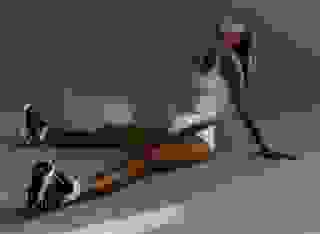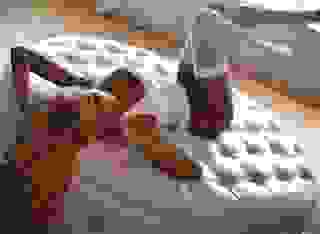- Romance
- Fiddler's Rest
- Page 4
Note: You can change font size, font face, and turn on dark mode by clicking the "A" icon tab in the Story Info Box.
You can temporarily switch back to a Classic Literotica® experience during our ongoing public Beta testing. Please consider leaving feedback on issues you experience or suggest improvements.
Click hereBill's reticence meant he wasn't overly aggressive in our relationship. Thus, it caught me completely by surprise the unusually warm day in early spring that Bill came to Fiddler's Rest and told me he was kidnapping me for a tour of his garden and lunch at Sondra's Grille on the waterfront. He announced that he wanted me to meet the restaurant's proprietor, Sondra Laurens, who he said he thought I'd take a liking to.
As we left, I shot Maddie a nasty stare, and she looked sheepish. It was pretty obvious that she'd taken her idea that I needed a local girlfriend I could talk to straight to Bill. I later saw the irony in this that summer, after I'd caught Bill and Sondra making sizzling hot sex on his front porch. The funny thing is that I did, indeed, take a liking to Sondra, a perky, slim blonde with limitless energy and a straightforward attitude and smart mouth. And I didn't blame her for having sex with Bill, because he was very discrete in public about our affair, and I never did confide in her that we were more than a contractor and client who had become friends. By the time I'd seen the two of them together, I enjoyed her company enough that I said nothing and just continued socializing with her. I put the blame for the cataclysmic event that spun Bill out of my life entirely on him.
Bill first took me to his house that day, a three-story brick mansion on, significantly, Hamilton Street—the very same house Julie and I had seen and spun a story about that first time I ever saw it and where I'd seen the man of several dreams lounging on the porch. I got a tingling sensation from the coincidence of having won the interest of the man of my dreams.
In no time flat, I saw what Maddie meant about Bill not being interested in me for my money. Beyond the servants who we drifted by from foyer to kitchen to back garden, the furnishings and art work packed into the rooms I saw rivaled anything I'd ever seen in New York. That still didn't tell me that Bill wasn't interested in getting Fiddler's Rest the only way he could—through me—though.
After our tour of the house, we walked over to Bay Street for lunch at Sondra's Grille and to meet Sondra. Like most of the other restaurants and shops on the waterfront side of Bay Street, Sondra's Grille was a series of long, narrow rooms running back from the street entrance to a covered patio facing the waterfront across an apron of lawn and trees. You could approach the restaurant from either the street or the waterfront.
Sondra was sitting at what must be her special table on the covered veranda at the back, and she graciously treated us to a sample of her extensive menu. I could tell even then that she and Bill were completely comfortable with each other, and it didn't take me long to learn that she was a local too and that they had gone to school with each other from kindergarten through high school, at which time he went north to the university and she began waitressing and moving up to owning her own restaurant.
I was hoping that I'd have an opportunity to talk with Sondra alone—especially after learning she'd known Bill all her life—to see if she could give me some inkling into his restraint in discussing his childhood. I was assuming that I'd have to do this on a return visit, but as we sat there, a couple of guys passed by who Bill said he wanted to talk to, and he bounded down the steps and onto the waterfront promenade.
It took me a few minutes, but I finally got the opening to broach the subject.
"I'm glad he was able to restore your house out at Fiddler's Cove," Sondra said. "I don't know when I've seen him this happy."
"Oh, does he seem happy to you?" I asked. "I've felt that he had some sadness that he hasn't felt comfortable telling me about. And he says almost nothing to me about his childhood."
"And that worries you?" Sondra asked. She was looking intently at me. If I was going to open up to her about the sexual relationship Bill and I had steamed into, this would be the moment. But I was afraid, and so I retreated. For months I wondered whether she would have backed off of Bill if she'd known we were sleeping together—and I told myself that I though she would have.
"No. Well, yes, his reticence about his family worries me a little. But just because I wonder if there's something I'm saying that is stepping on his sensitivities. And I don't want to do that."
"Has he mentioned his mother?"
"You mean his grandmother?" I asked, thinking back to the tragic story Maddie had told me about Fiddler's Rest. But as soon as I said that, I saw from the confused look on Sondra's face that she either didn't know about that or it had no relevance to what she was going to tell me.
I quickly backpedaled. "Oh, sorry, his mother. No, I didn't know anything about that."
Sondra paused, obviously perplexed about what, if anything, to tell me. But she didn't get the chance to pursue the issue farther, as Bill returned just then, all smiles and full of good news of having landed a lucrative house restoration job from the guys he had gone off to talk to.
The topic did not come up again for some time when I was alone with Sondra, which was a tragedy in itself, as it would have brought needed clarity to a significant event later that year.
* * * *
"Hello, Mom. Surprised to see me?"
That was an understatement, as the young man standing at the front door of Fiddler's Rest was about my own age and I'd never seen him before in my life. He'd greeted me with a chipper smile on his very-nice-looking face, a bouquet of roses clutched in his hand, and a heavy suitcase at his side, but his face took on a more wary look when he saw my jaw drop.
"Eh, I guess I should have called first," he said in a newly sheepish voice. "And I guess my old man may not have told you about me." It was said with a half questioning. "My father—Donald Drake."
I stood there dumbfounded, but both I and the young man were saved by the appearance behind me of Maddie.
"Mister Drake did'n tell us about havin' no son. So, if you don' mind showin' some ID or something. Otherwise you ain't crossin' this threshold until Mr. D. gets back from his daily practice in that old tub of his."
"Old tub?" The young man asked, now his confusion matching mine.
"Sailboat, honey. He gots his self a leaky tub he calls a sailboat."
"But Dad doesn't sail."
"Don' you know it," Maddie said with a snort. "Now we don' mean to be unhospitable, but no son of Mr. Drake was expected, so if you could just show us somethin."
"Oh, yes, yes, of course," he said as he rummaged around in his jacket pocket. "Ted. My name's Ted Drake. And I'm sorry for the introduction. I had to suss out that Dad had gotten married again and sleuth out where you two were living. But it hadn't occurred to me that he wouldn't have told you he had a son—or that you would be so young—and so nice looking."
"No, no," I mumbled, just now starting to recovering my voice. "I knew he'd been married before, but . . . Oh, thanks, I'm sorry. Yes, of course you must come in. Come on back to the porch and we'll wait for your father to come in off the river. You'll be staying with us, I hope."
That seemed fairly obviously his intent, as he had his bag sitting on the front porch beside him, but I was running on autopilot on greetings.
"Do you have any idea how long you'll be visiting?"
"I rather hoped I was coming home," Ted Drake said. And he flashed me a smile that was pure "I want something" Don Drake. There no longer was any question in my mind that Ted was related to my husband. I knew that look entirely too well. Ted had arrived not more than three months after Don and I had settled in at Fiddler's Rest, and it was just the sort of off-centering surprise that Don was prone to spring on me.
When Don appeared, strolling slowly up from the dock to the screen porch, where he had time to see Ted before anyone said anything, he gave no reason why he'd neglected to tell me he had a son. He treated Ted's arrival in an off-hand matter with just a slight noticeably touch of irritation. And then, doing little to dispel the awkwardness of the situation, he just let the young man settle into our home as if I had nothing to say in the matter at all.
I didn't mind all that much, really. It was more of a not having been informed or consulted about it that was an irritant.
But the whole arrangement proved to be an ongoing irritant, and I can trace my life of being unsettled and suddenly not being able to concentrate enough to write more than a couple of thousand words a day on my new manuscript to the day Ted Drake entered our lives.
He was a very nice-looking and pleasant-mannered young man, and if he was sponging off us money wise, it certainly wasn't from my accounts. He even gave Maddie money to help with the household expenses, which mollified her considerably even if it didn't win her completely over. And it's not that he was loud or obnoxious. Quite the contrary, really. But he always seemed to be there, in the background, watching me and watching Don—as if he was waiting for something to happen. The only time he ever left the house was sometimes while Maddie was there. It didn't happen enough of the time for me to suspect that he didn't like being around Maddie, but it did seem a little strange. And when he left the house, it was to drive into town and shot pool with locals at a beer hall and to take photos in the blue-collar part of town and out at the marina.
It was quite clear that the father and son were not close and were barely more than cordial, and although Don had been nonchalant about his son's taking up residence with us, I had the impression that he didn't really want his son here—that it had been no accident that he hadn't told his son about our marriage or where we were living.
Being a novelist, I started weaving all sorts of scenarios in my mind. What if Ted had just come out of prison—or an asylum—or was hiding from someone? Were we safe? Was there something between father and son that I should know about, something that could be a danger to me—or Maddie—or Don, for that matter?
I tried talking to Don about it, but he just shrugged me off. He said his son had always been a drifter and had gone to live with other relatives after the death of Don's first wife—apparently willingly. That was the closest I came to a discussion on this with Don, and my questions were thrown completely off the rails when Don had mentioned his first wife's death. I don't know why I had made the assumption, but I had assumed that the first marriage had ended in divorce.
The house grew strangely quiet. Don spent an increasing amount of time in New York, and when he was at Fiddler's Cove, he was often out in his sailboat—practicing maneuvering it around in the river and heading out toward the sound, while never actually sailing out into the rougher waters of the sound. But he never became a proficient sailor, and I wondered why he kept at it. Don seemed the type who was either very good at something or else that something didn't even exist for him.
Ted didn't talk much either. He spent much of his time taking photographs. And this seemed to be his vocation, to the extent that he had one. He took fine photographs, and he entered them into contests and occasionally won. He had a portfolio of photos for commercial use on an Internet photography service, and he apparently made money with that. Don told me that Ted also occasionally wrote up travel pieces to go with his photographs and got them published in vacation magazines and in the travel sections of newspapers, although I didn't see any examples of Ted's writing.
But Ted's photography was as much a solitary profession as my writing was. And Don's work required concentration and quiet as well. When he wasn't in New York or sailing, he sat quietly at my business desk—I had to keep my writing environment completely separate from my business papers—on the porch facing the river and worked on placing the manuscripts of the few author clients he had with publishers. I assumed that I was, by far, his most lucrative author client, and I was established with my publisher. There wasn't much effort needed by him on that account. But he had other author clients, although he was reticent about discussing them with me, and he had money coming in—enough that we kept our financial affairs separated. Don lived expensively, so I may have been kidding myself about being his best-paid client.
So, there we were, three introspective hermits living under the same roof under a cloak of silence. Sometimes Maddie broke the silence with a song or exclamation from the kitchen, though—almost as if she felt she needed to pop an expanding balloon so that we could start our three-way standoff from the beginning all over again.
And it did feel like a three-way standoff, with Don lifting his head occasionally to give Ted a wary look, which would catch my attention. And when it did catch my attention, me realizing that Ted was carefully watching both Don and me—snapping our pictures every couple of minutes, but without the camera.
I found myself sinking into a blue funk. And this wasn't only because of the heavy atmosphere at Fiddler's Rest—the sense that a storm was coming, ready to break at any moment.
I started sliding into a depression the day I was visiting with Sondra Laurens at Sondra's Grille some two months after we had bought Don's sailboat and Bill Hamilton had snubbed me at the Beaufort marina.
Sondra and I were sitting at her table on the back porch of the restaurant and watching the water craft gliding between the marina and the river channel. She drew my attention to a fisherman going back and forth between the dock and a truck, lugging heavy coolers. I turned and looked and saw Bill Hamilton.
"Isn't he a hunk?" Sondra said.
"Um, yes, yes he is," I said, trying not to choke on the cola I was drinking. What she said gave me a flash of anger, but I suppressed it as best I could. She didn't know that Bill had been double-timing each of us with the other—quite possibly with other women on the string as well. And, in fact, I was embarrassed, because I suppose I should have said something before now to warn her. If he had been playing me that way, he was probably doing it to her too. And I liked Sondra and didn't want to see her hurt—certainly not as badly hurt as I had been.
"And to think he's all mine," Sondra said.
I choked back what easily could have been tears, on the brink of telling her the lie of the statement, but unable to go over the brink, knowing that if I did so, I might save Sondra, but I'd surely lose her as a friend. So, I didn't say what should have been said; instead, I gritted my teeth and whispered, "I'm glad for you and Bill."
"Bill? Excuse me, but did you say Bill?" Sondra asked, as she turned to me, her eyes full of confusion.
"You and Bill. I said I'm happy you've found each other." I managed to say it with a stronger voice this time.
Sondra sat, rigid for the longest moment, a funny look on her face. And then she gave a honking laugh. "That's not Bill, honey. That's Jim, his brother. They're identical twins. Didn't you know that? Bill's always been a friend—a good friend, but it's Jim I've always kicked my heels up for. I've been after him since grade school. And now I've got him."
Indeed I had not known the Hamilton men were identical twins, and the embarrassment and horror of the realization of what this was all about—what I'd thought I'd seen on the porch of the house on Hamilton Street that day but hadn't, in fact, seen—rushed through my body and I felt foolish and faint all at the same moment.
"Identical twins? But then how can you tell from this distance that it isn't Bill?"
"No mystery about that, toots," Sondra shot back. "You would never catch Bill near the water. Jim's the waterman. Bill's never gone near the water since his mother . . . say, I never did tell you about his mother, did I? And you asked me once. I'd forgotten I hadn't told you."
It was my turn to produce a funny look and feel confused.
"It was a boating accident, out at the mouth of the river," Sondra began. "Bill's mother loved to sail, and she'd take the boys out with her, one at a time. Her love for the water rubbed off on Jim, and he went into the fishing business. But Bill won't go near the water now. A squall came up while he and his mother were out there on the river, and the sailboat capsized. Bill's mother struggled out of her lifejacket when she saw Bill was still going under in spite of the one he was wearing—and she got that one to him. The rescuers who had hit the water as soon as they saw the squall, knowing there would be sailboats caught by surprise out in the sound, managed to fish him out of the water. But his mother was gone. She washed up down on a beach on Port Royal the next morning. Bill's never wanted to talk about it. It can't be convinced, no matter how much people have tried, that her death wasn't his fault."
This was all too much for me. I went limp, and Sondra got me to her apartment above the restaurant and looked after me until I was strong enough to go home. She naturally thought that the story had been too much of a shock for me, and I couldn't bear to tell her that the sense of loss I felt extended way beyond the story of the drowning of Bill's mother and his subsequent acquired fear of the water. I couldn't tell her that my whole relationship with Bill had been changed by what now appeared to be a mistaken view of her making love with his twin brother on the front porch of their house on Hamilton Street.
I somehow made it home, but from that day the hours seemed to drag on me, and now I was happy that Fiddler's Rest was a quiet refuge. All of my feelings for Bill flooded back, displacing whatever I had felt for Don Drake. And along with it came feelings of guilt and despair—the feeling that my life had taken a very wrong turn and there were no brakes on just careening down the wrong path. And the knowledge that I had done this to myself and would have to live with consequences. This wasn't either Don's fault or Bill's. This was all on me.
The feeling of foreboding in the house only increased, and I sank into depression. At the same time, my mind started to race on the possibility of danger ahead when strange events started happening in the house.
Don was home now, and he was talking of taking me sailing, a topic that agitated Ted for some reason whenever it came up in conversation. Ted was staying closer to me now, and a new fear was developing in my mind. Was Ted forming an attachment to me? Could I be in danger from Ted for a whole new reason that had never occurred to me before? Was there something in Ted's background or makeup that gave reason to Don's trying to keep our marriage and where we lived from Ted? And now that Ted was here, was Don torn between conflicting responsibilities to his son and me?
Had Ted somehow been responsible for his mother's death. No, I told myself, that was extrapolating Bill's story onto Ted. I wanted to slap myself for letting my vivid imagination run away on me. I didn't like this reality that was pressing on me; I much preferred being in complete control of my plots.
I was both angry and concerned the day Don was out in the sailboat and Ted had driven into town and I went to my desk on the porch to check on a question I had about my book royalty statements the previous quarter. I found that my papers in the desk were out of order—even the ones in the locked drawer. And, upon inspection, I found that the lock on that drawer had been jimmied—that there were scratch marks along the edge from some small-blade tool that had been used to spring the lock. It was an antique desk, and the lock was more decorative than functional, so it hadn't been hard to spring. But the wood was damaged, and my privacy had been breached. The papers I'd kept in that drawer included my will, and I could tell that the will hadn't been refolded correctly. Someone had been looking at my private papers—someone other than me.








